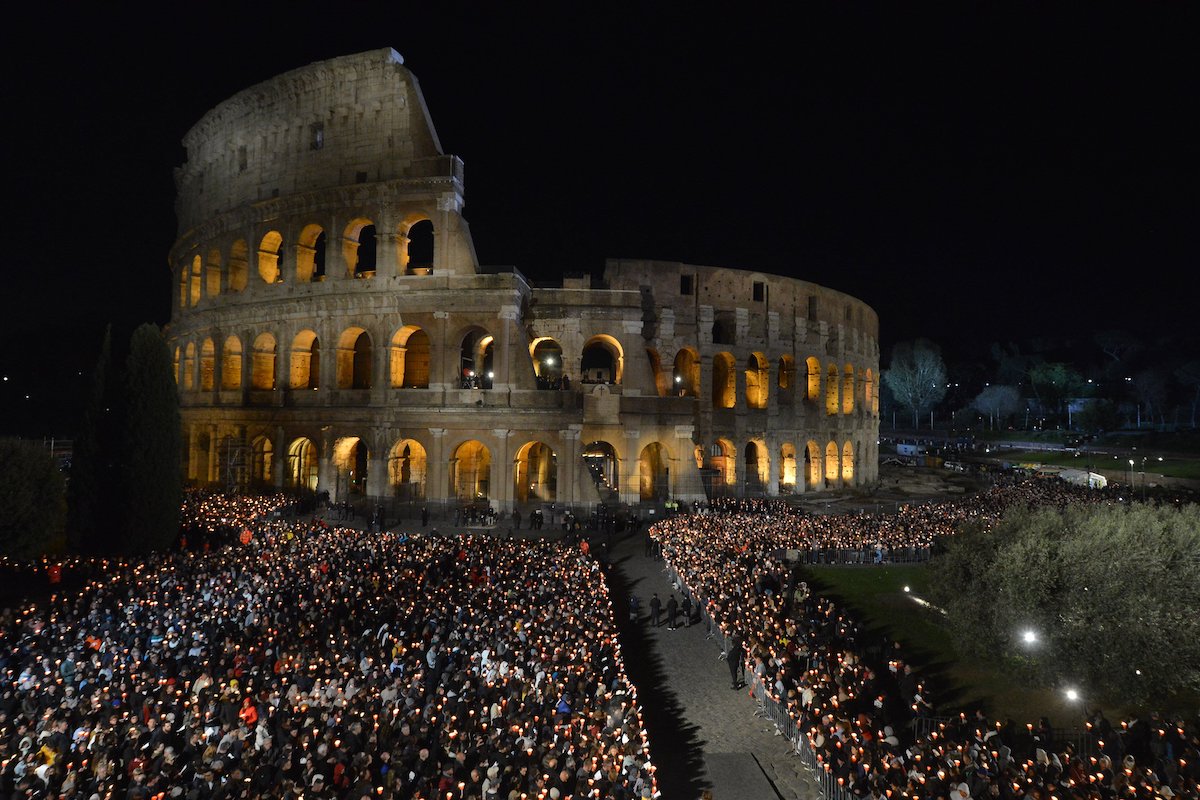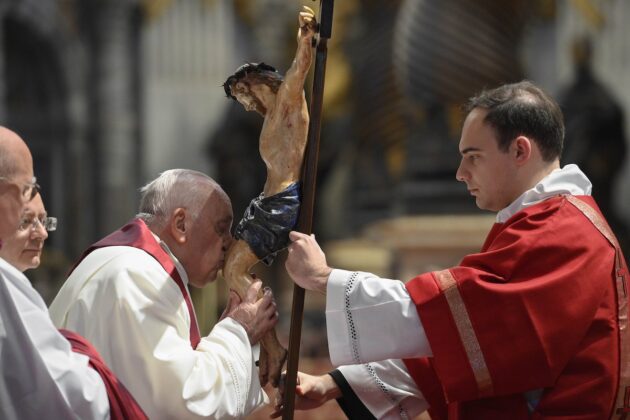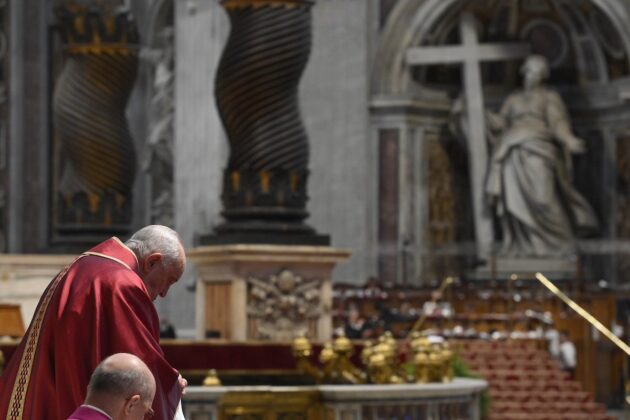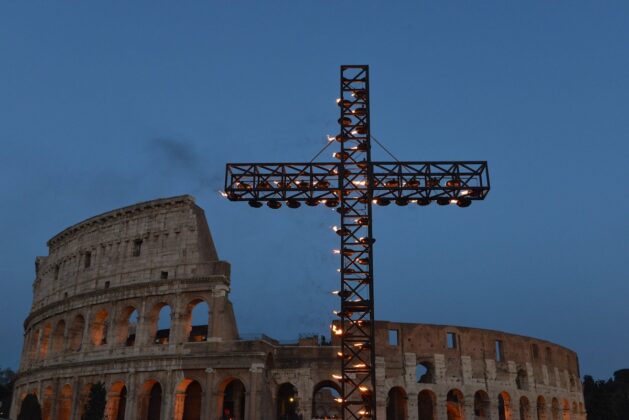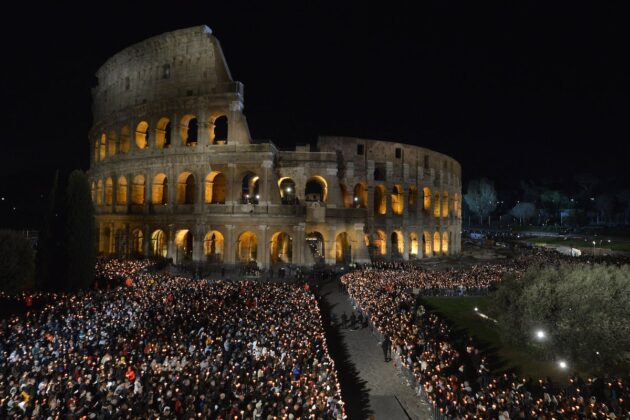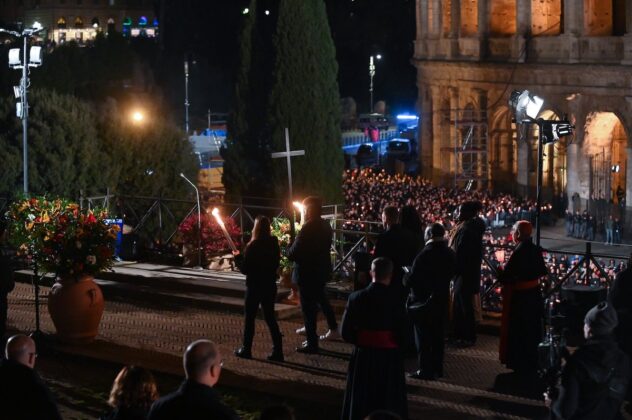By Carol Glatz, Catholic News Service
ROME (CNS) — Instead of presiding over the nighttime Way of the Cross seated atop a hillside overlooking Rome’s Colosseum, Pope Francis followed the service from his Vatican residence, spiritually united in prayer with the 20,000 people gathered outside the ancient amphitheater April 7.
Pope Francis would not be in attendance, the Vatican press office had told reporters several hours before the ceremony, “due to the intense cold these days.”
Late evening temperatures had been around 52 degrees Fahrenheit (11 degrees Celsius) and the pope had been released April 1 from the hospital where he had spent three nights for a respiratory infection. The pope had a slight cough and rough voice when he recited some of the prayers earlier in the day at the Good Friday Liturgy of the Lord’s Passion.
The last time a pope did not attend the outdoor ceremony was in 2005 when an ailing St. John Paul II was televised praying and watching the live television broadcast of the ceremony from his private chapel. In 2020 and 2021, Pope Francis led the Way of the Cross in St. Peter’s Square because of the COVID-19 crowd restrictions.
Each year, the pope chooses a different person or group of people to write the series of prayers and reflections that are read aloud for each of the 14 stations, which commemorate Christ’s condemnation, his carrying the cross to Golgotha, his crucifixion and his burial.
The theme this year was “Voices of peace in a world at war,” and several dicasteries of the Roman Curia formulated the prayers and meditations drawing from what Pope Francis has heard from people suffering from a lack of peace during his apostolic journeys and on other occasions.
The solemn torch-lit service in the Colosseum gave voice to those who have survived extreme violence, war, terrorist attacks, poverty and human trafficking and torture as migrants seeking a safer or better life.
By passing a bare wooden cross from one group of people to the next in succession, those chosen to lead the Way of the Cross were visible representatives of different geographical regions, not the authors of each meditation. A number of those who carried the cross were refugees assisted in Rome by the Jesuit Refugee Service’s Centro Astalli.
Two nations — Ukraine and Russia — were mentioned by name during the 10th Station, Jesus is stripped of his clothes.
The meditation speaks of a Ukrainian family fleeing and then returning to their war-ravaged city as the son holds onto his grandmother’s faith and hope that “everything will pass, you’ll see. And with the help of the good Lord, peace will return.”
The young man from Russia wonders why he feels guilty when he and his friends fear war, his older brother has died, no one knows what has happened to his father and grandfather, and his mother and grandmother weep. “Everyone told us we should be proud, but at home there was only much suffering and sadness.”
“Purify us, Lord Jesus,” from resentment and bitterness, violent words and reactions, attitudes that create division, and seeking to look good by humiliating others, the prayer said.
The Fifth Station, Simon of Cyrene helps Jesus carry his cross, reflected the voices of three migrants, who came from Africa, South Asia and the Middle East. Each one expresses the sadness of being hated, mistreated and disrespected.
Frequently, one’s life is reduced to “a check on the boxes of a form. I must choose: foreigner, victim, asylum seeker, refugee, migrant or other. Yet what I want to write is: person, brother, friend, believer, neighbor. Who will be a Cyrenian for me?” the meditation said.
The concluding prayer at the 14th Station, which was to have been read by Pope Francis, was read by Cardinal Angelo De Donatis, the pope’s vicar for Rome. It was a list of 14 “thank yous,” expressing gratitude to Jesus for his “meekness that overwhelms arrogance,” his courage, peace and love “shown in the face of betrayal.”
“Thank you, for turning tears into smiles,” for having loved everyone without excluding anyone, for hope, mercy and the “forgiveness you offered your executioners,” it said.
“Thank you, Lord Jesus, for the light you kindled in our nights. In reconciling all divisions, you made us all brothers and sisters, children of the same father who is in heaven,” the cardinal said before imparting his blessings.
Earlier in the day in St. Peter’s Basilica, Pope Francis presided over the Liturgy of the Lord’s Passion, which commemorates Christ’s passion and death on the cross.
The pope began the rite after a silent procession down the central nave in a wheelchair.
Following tradition, the homily was delivered by Cardinal Raniero Cantalamessa, preacher of the papal household.
The papal preacher said, humanity is nothing without God.
He reflected on the consequences of philosophies that have proclaimed a fatalistic, hopeless form of the “death of God” in a “de-Christianized Western world.”
“But history, literature and our own personal experience tell us” that “there is a transcendent truth that no historical account or philosophical reasoning could convey to us,” he said. “God knows how proud we are and has come to our help by emptying himself in front of us.”
“As believers, it is our duty to show what there is behind or underneath” proclamations of relativism and nihilism, that is, to show the truth and new life brought by Christ’s resurrection.
“At every Mass, after the consecration, we say or sing: ‘We proclaim your death, O Lord, and profess your resurrection until you come again.'”



